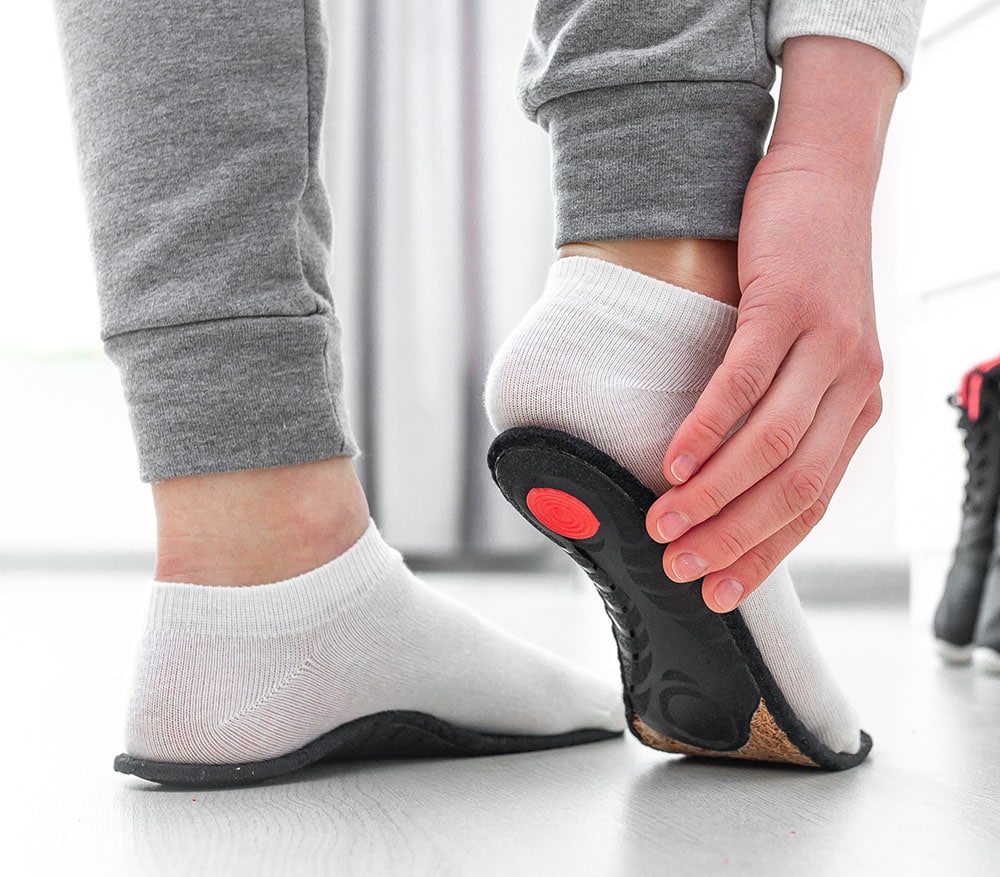Plantar Fasciitis
Your heels bear your body weight and absorb the shock of your movements day in and day out. For as strong as your joints, ligaments, muscles, and tendons are—and how well they work in concert—they naturally break down over time and, therefore, make you susceptible to developing chronic conditions or sustaining injuries that cause mild, moderate, or severe heel pain. One of the most common—and most painful—foot conditions you can develop is called plantar fasciitis.
What is
Plantar Fasciitis?
The plantar fascia is a rubber band-type ligament that connects your heel bone to your toes. It’s responsible for supporting the arch in your feet. Small tears can form in this fibrous band of tissue for a variety of reasons. Some of those reasons include tightness in your calf muscles, high arches or flat feet, weight gain, improper footwear, and/or an increase in the frequency and intensity of an exercise that demands a lot of your heels (running, for example).
Plantar fasciitis is a common foot condition that causes pain in one or both of your heels. The pain can become so intense that it disrupts your active lifestyle.
What are the
Symptoms of Plantar Fasciitis?
Symptoms of plantar fasciitis include pain and stiffness at the bottom of one or both heels and/or in the arches of the feet.
Many patients report that the pain feels worst in the morning. Patients also report that symptoms tend to become increasingly noticeable after exercising or after sitting down for an extended period. The reason for more pain in the morning or after resting for a while is that not using the plantar fascia causes it to cool down and tighten up. When you get moving, the plantar fascia loosens and warms up, then the pain will lessen.
The pain caused by plantar fasciitis may be dull or sharp/stabbing. You may also experience swelling near your heels or ankles. Other symptoms include a burning sensation or aches in the bottom of one or both feet.
Plantar fasciitis develops gradually over time. Symptoms can worsen if the condition is left untreated.
How to
Treat Plantar Fasciitis
Patients are always happy to hear that there are numerous ways to treat this frustrating and oftentimes agonizing foot condition. Rest assured that you don’t have to live with the pain that plantar fasciitis causes. The sooner you are evaluated by our trusted podiatrist, the better.
Common treatment options for plantar fasciitis include custom orthotics, MLS laser therapy, and massage gun therapy.
Custom Orthotics
Custom orthotics are effective medical devices that are fully customized to give your heels and feet the support and cushioning they need for walking, standing, and performing other common movements. Custom orthotics are inserted into your shoes and designed to accommodate the unique structure of your foot. A well-made pair of custom orthotics can significantly relieve your heel pain.
MLS Laser Therapy
MLS Laser Therapy is an FDA-approved, light-based treatment option that Dr. Gilmore may recommend as a reliable and effective way to treat your plantar fasciitis. What makes this treatment option unique is that it is completely painless and non-invasive. MLS laser therapy is an advanced form of therapy that works well to stimulate and accelerate the body’s natural healing abilities.
Massage Gun Therapy
The purpose of massage gun therapy is to produce what we’ll call “healing vibrations”—in other words, think of this treatment option as the equivalent of a deep tissue massage for your feet. The massage gun is a handheld device that makes it easy for our staff to deliver targeted focused pressure on the plantar fascia ligament.
One or more of these treatment options can help relieve the pain associated with plantar fasciitis and get you back on your feet. Dr. Gilmore can discuss these and other treatment options with you more in-depth during your consultation.
Find Relief at
Capital Podiatry
If you suspect that you may have plantar fasciitis, please contact Capital Podiatry Associates to schedule an appointment. Our office is located at 8101 Hinson Farm Road, Suite 301 in Alexandria, Virginia, and our team is here for you. Please contact us using our online contact form or give us a call at (703) 560-3773.
Please don’t allow your heel pain to linger. Instead, get in touch with us as soon as you can so Dr. Gilmore can evaluate your feet to determine if you have plantar fasciitis or another underlying foot condition. No matter your diagnosis, you can be sure that Dr. Gilmore will be dedicated to helping you take all the right “steps” toward returning to a pain-free, active lifestyle.

